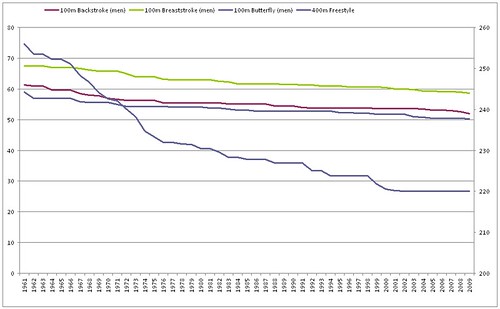Should a swimsuit that cuts time off your lap be allowed in international competition? It's like a national referendum question; you want to answer, "sort of".
Like if there is a race that comes down to .0001 seconds difference and winning swimmer's encased in super-thin woven elastane-nylon and polyurethane and the other's in board-shorts then you might think that the LZR suits are cheating somehow.
Or if all the swimmers have them, then it would seem ok, right? Or is it still cheating?
Swimming is about whom can travel the fastest through water over a particular distance while doing a particular thing with their arms and legs. Obviously to go faster the swimmers would remove bits of clothing (and hair), because the swimmers want to show exactly how fast they can go without hindrance. Of course you don't remove everything because the drag caused by clothes is less than the drag caused by your (ahem) dangly-doos.
Given there are certain constants we are working with (the viscosity of water for example) and certain constrained variables (human skin surface area etc) world records of this type should be asymptotic, right?
So, at the risk of being laughed at in the future, we will never see a 219 second Men's 400m freestyle. At the very best we will be able to measure the times better, shaving smaller and smaller amounts off the world record, unless we change the rules.
So, is a suit that keeps you more buoyant and slides through water better than skin, removing hindrances or adding advantages?
The Speedo LZR suits were officially released in 2008 and as it currently stand only two men's records (1,500m and 800m Freestyle, both to Grant Hackett) and one women's record (1,500m freestyle to Kate Zielger) were broken before 2008.
I made a wee chart of the records for men's events that have been broken so far this year to see if there were any noticeable trends that the introduction of the new suits might have caused. Note: I only did men's events because there were too many women's events where the world record was broken this year (12 in total and eight of those were at the World Champs) and I'm kind of lazy like that. Click for a bigger version.

(the 400m freestyle is plotted against the right axis, all others against the left)
As you can see my 400m freestyle prediction wasn't totally crazy. But take a look at the 100m backstoke.
The record took a big dip in 1991 when Jeff Rouse shaved 0.58 seconds off the previous time. Then in 2004 Aaron Peirsol grabbed the record by first shaving 0.15, then 0.28, then 0.19, then 0.09 seconds off. Then at the Olympics last year he removed another 0.35 seconds. Finally this year, at the world champs, Peirsol regained the record (he had lost for seven days) by taking 0.44 seconds off.
That 0.44 seconds represents the second largest margin that the record has been broken by in almost 50 years. And this came after Peirsol had already broken the previous record by a combined 1.06 seconds. Clearly he's a good swimmer but that 0.44 and the 0.35 before it seem to be almost too good. The suit is making good swimmers into world record holders and world record holders into world record destroyers.
The Science of Sport noted that veteran swimmer, Frederick Bosquet, breaking the 50m freestyle world record by 0.34 seconds was the equivalent of a 2:14 marathon runner showing up and running a 2:06 in their tenth year. And then they raised this very good non-scientific point:
…there is a fundamental problem when the history of the sport is basically rewritten. Legends of swimming have been relegated to footnotes within a year, men and women who featured in the top 10 of all time now lie outside the top 20 and there is an unnatural distribution of times by era.
But more than this, the problem is that swimming records are now broken so often that they lack all credibility. And while some will argue that the point is the race, not the time (which is partly true), there is a lot to be said for history of sport, and the perception among sports followers (not necessarily swimming followers) when record-holders emerge from nowhere and are replaced only months later by similarly 'unknown' swimmers - the suits have enabled this scenario.
FINA has now banned the suits, so what do we do with those records? It's certainly possible that some of those times won't be beaten for a very long time now. Do we append all of them with asterisks or do we let them sit?
In the end it could be that the only people to win the in the swimsuit wars were the perverts.